Isn’t it thrilling to see how fast the world is changing and is now almost driven by AI technologies? Even your Snapchat gives you an AI friend to help you out with every difficulty.
This advancement extends even to the field of day-to-day life, for example, the living AI robot and in the marketing sector like in SEO. But how does AI help in SEO?
Applications of AI in SEO include data optimization, content creation, automatic upgradation, creation of personalized content, keyword optimization and search based on content and user search data etc to increase the visibility, ranking and traffic of the websites, and many more.
If this is how it helps the digital world now, you might be processing what AI beholds in the future.
The future of AI in SEO has a crucial position in shaping search engine optimization. The evolving and changing algorithms of AI work on providing more user-personalized content, decreasing the workload of SEO teams, and increasing productivity and efficiency.
The shift to AI will change the paradigms of how the website works.
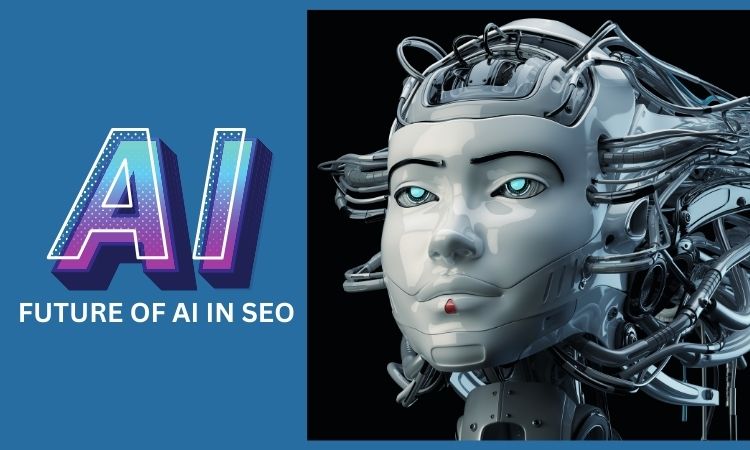
Table of Contents
ToggleHow AI Technologies Reshaping SEO
The application of AI in SEO works on technologies which are AI-driven, allowing SEO professionals to better understand and adapt to the latest seo trends and algorithm changes.
1. Natural Language Processing (NLP) and its role in content optimization
Natural Language Processing is the AI algorithm which helps the search engines understand the intention of the searched data, the context and meaning of the content precisely to give more relevant results.
- This works by breaking the content, and phrases, searching the keywords and understanding the context in terms of the content’s intention and nuances of natural language.
- The use of models like CNNs, RNN and architectures like GTP, and BERT (introduced in 2019) are used for deep learning.
- In the case of optimization of the content, it is estimated to account for 30-50% of the efforts of SEO, whereas in understanding user intent, it is estimated to contribute to 20-30% of the efforts.
2. Machine Learning (ML) algorithms for predicting search engine behaviour
Machine learning is the algorithm used for predicting search engine behaviour and other algorithms. It analyzes the behaviour of the search engines like the search history, user’s search data, and how it works in ranking the content.
- It helps you predict how the contents will get ranked based on the vast data accumulated by appealing to the target audience and eliminating errors.
- About 57% of businesses undertake the use of ML to improve the user experience. The 2017 data shows that Netflix saved $1 billion with the help of ML in giving personalized user experience.
3. Image and voice search optimization with AI technologies
Didn’t you also use the voice feature of Google? Almost every other user uses image and voice search features of the platforms to make their search efficient.
- During image search AI allows the search engines to understand the context of the images by using ML to enable the websites to have their images with efficient captions and use image search.
- But how does Voice search optimization work? It understands the context of the voice searches, letting the professional optimize the content with conversational keywords for better results.
- The use of Alexa, Siri, Google Assistant and Microsoft Cortana has made it necessary to optimize the search results as almost 27% of the world population uses voice search on mobile.
- Almost 93.7% of search queries on average are answered by the voice assistant. In local voice search, the AI is said to be able to contribute to 10-20% of SEO efforts.
Also Read: A Simple Guide To Create SEO- Friendly URLs: SEO Tips for Everyone
Current Uses of AI in SEO
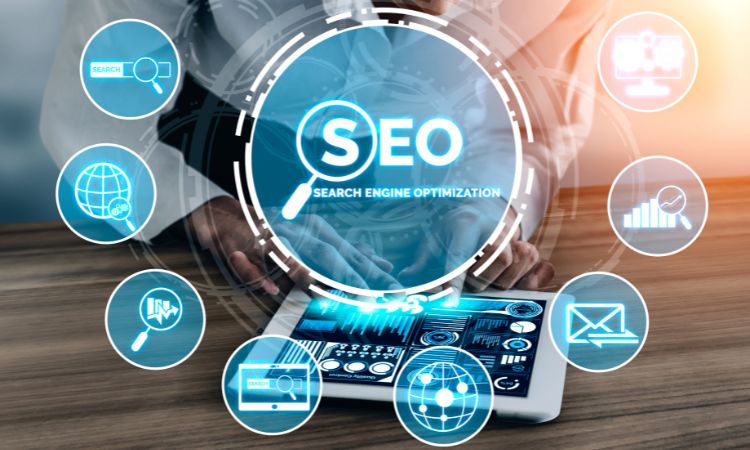
But why is it even necessary to use AI in SEO? Around 68% of all the users’ experience online begins with search engines as stated by Bright Edge, which might force you to improve the online experience of your users. Here’s how AI helps in it.
1. Content creation

Highly rich and relevant content generation is a must for rising in the rankings. AI tools like ChatGTP, Copy.ai, Writesonic, AI Writer, etc help in creating impressive content without much effort.
It allows you to generate content on current trends and user search history with human resemblance with the use of semantic relations of language.
2. Automatic generation of optimized content

Though it can create new content, what about the present content?
Automated AI tools like GetGenie AI, Scalenut, and Diib analyze the present content of the website and refer to relevant changes like providing specific target keywords with huge traffic, optimizing it across different search engines, image optimization, etc for better visibility and ranking by evaluating factors like readability and relevancy.
3. Customizing content for search intent and queries
User query and search intent make up for the ranking of the website when they can provide relevant content.
ML algorithm helps in understanding the search intent by working on the semantic relation and exact demand of the user and providing personalized content for a better user experience.
You can go for tools like SEO.ai, Optimo, Google’s SGE, etc which work to provide search intent.
4. Keyword research

Want to increase your reach? Focus on keywords!
The work of AI tools like Google Keyboard Planner, MarketMuse, Ink, etc in SEO is to accumulate the large data of the website, understand the user query and provide target keywords to specific content so that the relevant content can be ranked.
Around 53.3% of the website traffic is from organic searches as stated by Bright Edge.
5. Identifying high-potential long-tail keywords
The voice search or organic search uses long-tail keywords, the AI-powered tools like SEOmator, KWfinder, Google Trends, Answer The Public, etc. here identify the high-potential long-tail keyword patterns and trends and optimize them to drive traffic.
The NLP and ML technologies work together to formulate the keywords. The analytics shows the keywords which lead the viewers to your sites and there you can find the long tail keywords. It can predict by the search behaviour the likely keywords that can drive traffic.
6. Uncovering semantic keyword opportunities
How do computers understand human language, have you given it a thought? The NLP helps in understanding the human language with the knowledge of the relation between phrases by identifying it with parts of speech, intentions, and simpler sentences and relating it to keywords to provide optimized, relevant and intended results.
7. Technical SEO
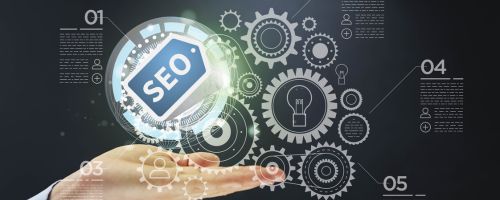
The areas of duplicate content, broken links, cannibalization, user-friendly, loading speed, ranking, crawling, and indexing come under technical SEO.
The automated AI tools work in performing the repeated technical SEO works and spotting the faulty areas to be rectified and worked on for better UX.
8. Automating site audits for errors, speed, metadata etc.

The automated site audits powered by the AI work in performing the SEO audits for the errors, website’s performance, ranking, visibility, webpage speed and metadata giving recommendations for optimization and reducing the team’s burden of manual labor.
Various platforms provide this feature like HubSpot AI tools, SEMrush, Diib, etc.
9. Generating landing pages optimized for target keywords
AI’s use extends to the generation of tailored landing pages for the targeted keywords and search queries to help with better conversion rates and better visibility for the website by letting the users land on desired results, thereby enriching the user’s experience.
You can go for Landingfolio, Kajabi, Landingi, etc to create optimized landing pages.
10. Link building

By now you might be thinking it is all that an AI could do, but wait there’s more to it!
Artificial intelligence can help you identify the areas where you can derive high-quality backlinks from legitimate websites and increase the search engine rankings of your website.
Some of the AI tools for link building are Linkhunter, BuzzStream, Pitchbox, etc. This can be done by analyzing the authenticity of the website and thus identifying sites for backlinking.
The use of AI in link-building opportunities means the identification, providing opportunities and assessing the quality of the website for link acquisition by analyzing the large data, finding reputable and impactful sites through search engines and helping in backlinking.
You can go for tools like Ahrefs, BuzzStream, Moz, etc.
Also Read: Off-Page SEO techniques to use in 2024
11. Automated outreach for link-building

Outreaching your link building refers to acquiring high-quality backlinks from reputable websites by reaching them through different internet platforms, most commonly LinkedIn and asking them to link back to your website.
This usually is a manual process however with the use of AI-driven tools like SEMrush, and LinkHunter, you can go for automated outreach for links-building like customized emails for outreach, identifying websites, etc.
Also Read: How Long Does SEO Take?
Future Trends in AI-driven SEO
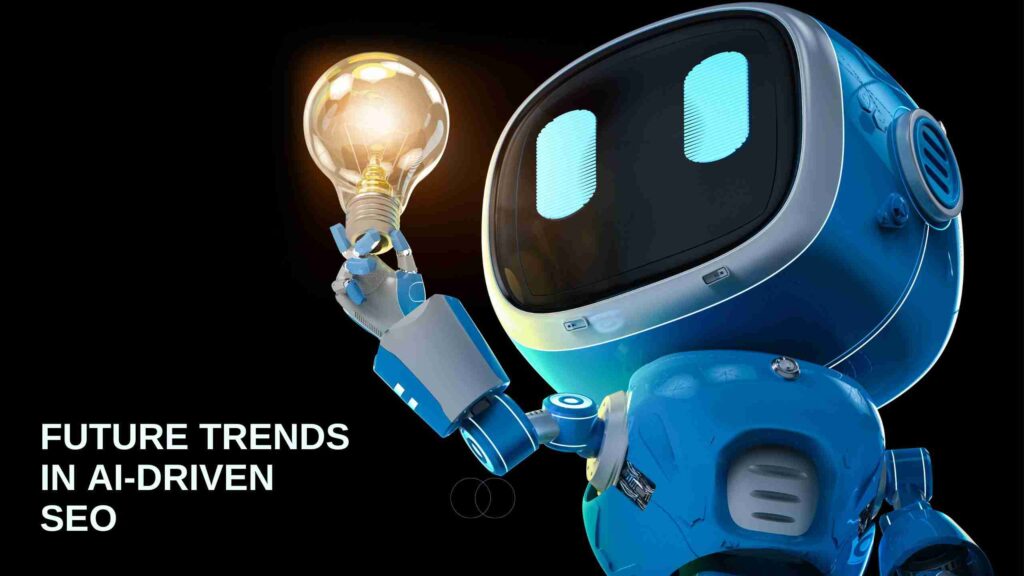
The role of SEOs as AI takes over tactical tasks
Wait, what will humans do if an AI tool does everything? Since the AI tool does the tactical tasks like keyword searching, automated auditing, giving real-time insight, optimization of the content, etc, the SEO team’s role turns to deriving the strategies, targeting the audience and doing campaigns to increase the traffic while supervising the AI-driven task.
Improved efficiency and productivity for SEO teams
The future of AI in SEO lies in increasing the efficiency and productivity of the SEO teams by decreasing the manual labor of performing automated and routine tasks like keyword searching, content optimization, etc increasing the efficiency and speed of the website.
This is done with the help of tools like Fraser, Jasper AI, and Surfer SEO, where you set the tool and choose the task that you want to automate with a defined workflow, and regular monitoring.
Higher-quality content creation and distribution
Ever heard of content creation tools? There are many popular content creation AI tools like Grammarly, Writersonic, Rytr, QuillBot, Copy.ai, etc which aid in creating high-quality content with regular upgrades. But how?
- The AI will be able to predict the trends of the future and allow the professionals to create the content users want to see along with geo-specific content by analyzing the search trends.
- It will present rich content by correcting grammar, spelling errors, and plagiarism and have highly optimized content.
The need for human oversight and strategy
A significant change from that of traditional practices to modern search is the future of AI in SEO. The role of humans will be more of overseeing the work of AI algorithms as it will determine the success of the website that is leveraging the insight provided into decision-making, strategy formation, and making changes as per the market demand.
New data-driven insights from AI to inform strategy
As the AI application increases in the business world, the future of AI in SEO moves to providing insights on the user’s intent, future market trends, and other new insights and the role of the SEO professionals would be to use these insights to form strategies for better experience, website optimization and traffic.
- This is done by predictive AI tools like Bing AI, Bard, etc using real-time search data, analyze click-through rates, and competitive analysis to give new data for strategy formation.
A better understanding of searcher intent and behaviour
Give a thought to how a website is ranked. It is the user’s intent that decides the relevancy of the website and its ranking. The future of AI in SEO will be directed towards providing a better understanding of the user’s intent.
- The NLP and Ml programmes will help the professionals to analyze the intent of the behaviour by studying the search history and user search data.
- The optimization of the content for the long-tail and semantic keywords helps in increasing the reach of the page and covering user intent.
The Benefits of AI in SEO
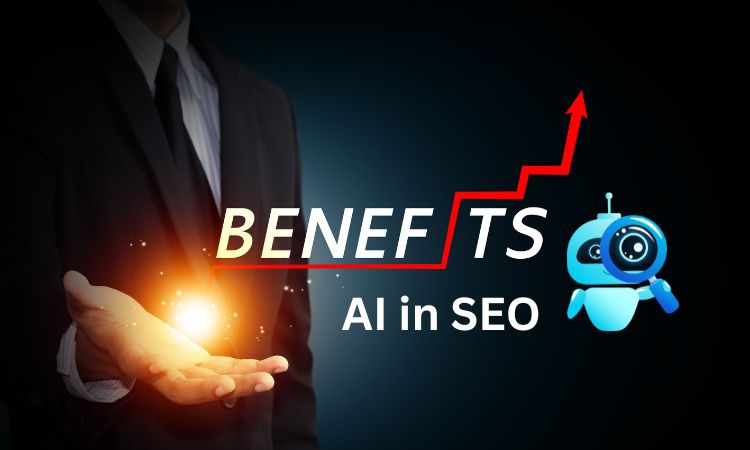
But what do you gain by implementing AI in SEO? Here’s the answer:
Enhanced user experience through personalized search results
AI-powered algorithms like ML and NLP work on evaluating user behaviour, search history, and preferences to provide users with personalized results.
The overall optimization by AI tools helps in enhancing the user experience by analyzing the user’s search pattern, demographics, and browsing history to know the user’s behavior enriching the overall experience and resulting in high click rates.
Improved content relevance and quality
User queries and the trends in content are analyzed to provide the most relevant topic. The semantic relation and related keywords are used to improve content quality and relevance. Structuring the content by using keywords, and images, and breaking complex sentences into readable formats are done by AI for better ranks.
This is by targeting specific keywords for specific content based on geographical settings and the target audience, updating the content based on the current trends and analyzing user’s behaviour and patterns by their search history. It benefits SEO by increasing the visibility and reach to the specific audience.
Automation of repetitive SEO tasks, saving time and resources
The automated AI algorithm works on doing repetitive tasks like keyword research, content optimization, link generation and other routine tasks so that manual labour can be reduced and human resources can focus on other valuable tasks like content creation, and strategy formation. The AI tools like SurferSEO, Jasper AI, etc are used and the task is chosen for automation.
The automated task is performed regularly but it must be monitored for any update or changes. This helps the SEO in avoiding any errors which may decrease the rankings.
Strategies for Adopting AI in SEO

- Investing in AI-powered SEO tools and platforms
You now might want to integrate AI tools into SEO but it is essential to know which area requires
the need of AI like optimization of content, image, voice search, linking, keyword optimization, etc.
|
Features
|
Name of the tool
|
Tool Work Description
|
|---|---|---|
|
Content creation and optimization
|
Jasper
|
Works on the generation of new content optimizing the existing one and improving the quality.
|
|
|
SurferSEO
|
Provide improvising suggestions like keywords, reliability, and structure and analyze the content.
|
|
|
MarketMuse
|
Uses the content strategy and topic clusters to plan and create the content
|
|
Keyword research and analysis
|
SEMrush
|
Performs keyword research and competitor analysis, rank tracking and is a comprehensive SEO platform
|
|
|
Ahrefs
|
Perform keyword search along with search volume, click-through rates and keyword difficulty
|
|
|
Keywords Everywhere
|
Search the keyword data in the search results and the extensions
|
|
Technical SEO
|
Screaming Frog
|
Does crawling of websites and finds technical issues like broken links, duplicate content and mobile usability.
|
|
|
Sitechecker
|
Performs website and technical SEO audits and gives website performance optimization suggestions.
|
|
|
Seobility
|
Does comprehensive technical SEO and checks website health and performance.
|
|
Link building
|
BuzzStream
|
Is an outreach platform for link-building and connecting to the other relevant websites for backlinking.
|
|
|
Majestic
|
Provides backlink analysis tools, find out the backlinks for your websites and also of your competitors.
|
|
|
Ahrefs
|
Gives backlinking evaluation and link-building features.
|
This is not an exhaustive list of AI SEO tools. Many other options are available, each with its own strengths and weaknesses.
The best tool for you will depend on your specific needs and budget. It’s crucial to research and compare different options before making a decision.
AI SEO tools are meant to assist, not replace, human expertise. Always review and edit AI-generated content for accuracy and clarity.
- Training teams on AI technologies and best practices
Along with having the tools it is essential to provide your team with the training and practice of AI and its technologies. It can be incorporated with the help of educating about AI, and its benefits, training and skill development programmes in areas of NLP and ML, providing demo experiences, peer learning and discussion forums for interactive sessions on AI applications.
- Continuous monitoring and adaptation to algorithm changes
You might be thinking that integrating AI into your SEO and your work is done! But wait, there is a continuous need to keep an eye on the changes in the algorithm or updates in it. Why?
- To be updated about the changes in SEO optimization and AI algorithms so you come up with new strategies.
- Use the tools to analyze your website’s performance, ranking, user experience and other optimization to know where changes have to be made.
Conclusion
The digital world holds SEO as a very crucial aspect of website development and digital search. The use of AI-driven tools in SEO serves as a valuable asset for the success and increased reach of the website.
The future of AI in SEO works towards reducing the workload and manual labour of SEO professionals, giving a better understanding of the search intent and behaviour, patterns, and trends of the content topics, and devising strategies to improve the website’s performance.
As this comprehensive analysis shows, AI is rapidly revolutionizing the future of SEO in countless ways. To stay ahead of the curve and fully capitalize on everything AI has to offer for your SEO success, partner with a leading expert agency.
AP Web World is widely regarded as the Best SEO Company in India. Our seasoned SEO professionals have the experience and capabilities to help implement cutting-edge AI-driven SEO strategies tailored specifically to your business needs and goals. Contact us today to learn more about harnessing the power of AI to boost your SEO performance to new heights.
FAQ’s
1. Will AI replace SEO professionals?
Ans: Though AI works in SEO optimization, providing automated work, it is unlikely that AI will replace the professionals as they will work and focus on higher value tasks like content creation, implementing AI tools and leveraging them, etc.
2. What new skills will SEOs need for AI?
Ans: SEO professionals will be required to acquire the skills and have an understanding of ML, NLP, data analysis, AI algorithms, its tools and its implementation. They must have comprehensive knowledge of the recent updates and the ethical aspects.
3. Can AI fully replace human SEO experts?
Ans: No, AI cannot replace SEO experts. It can help with repetitive tasks and decrease manual labor but human experts are needed to do the strategic planning, creative and critical thinking, processing the data accurately and others.
4. Which AI applications are best for SEO?
Ans: Some of the AI applications that are considered best for SEO are content generation and optimization tools, NLP and ML algorithms, keyword analysis platforms, SEO audit software, etc. You can also go for platforms like SEMrush, Fraser, etc.
5. What are the ethics of AI in SEO?
Ans: The ethics of AI in SEO include the privacy of the data, transparency of the rankings and search results, clear guidelines for the authorship of the content, avoiding the pre-present biases leading to discriminatory results, and accountability.



